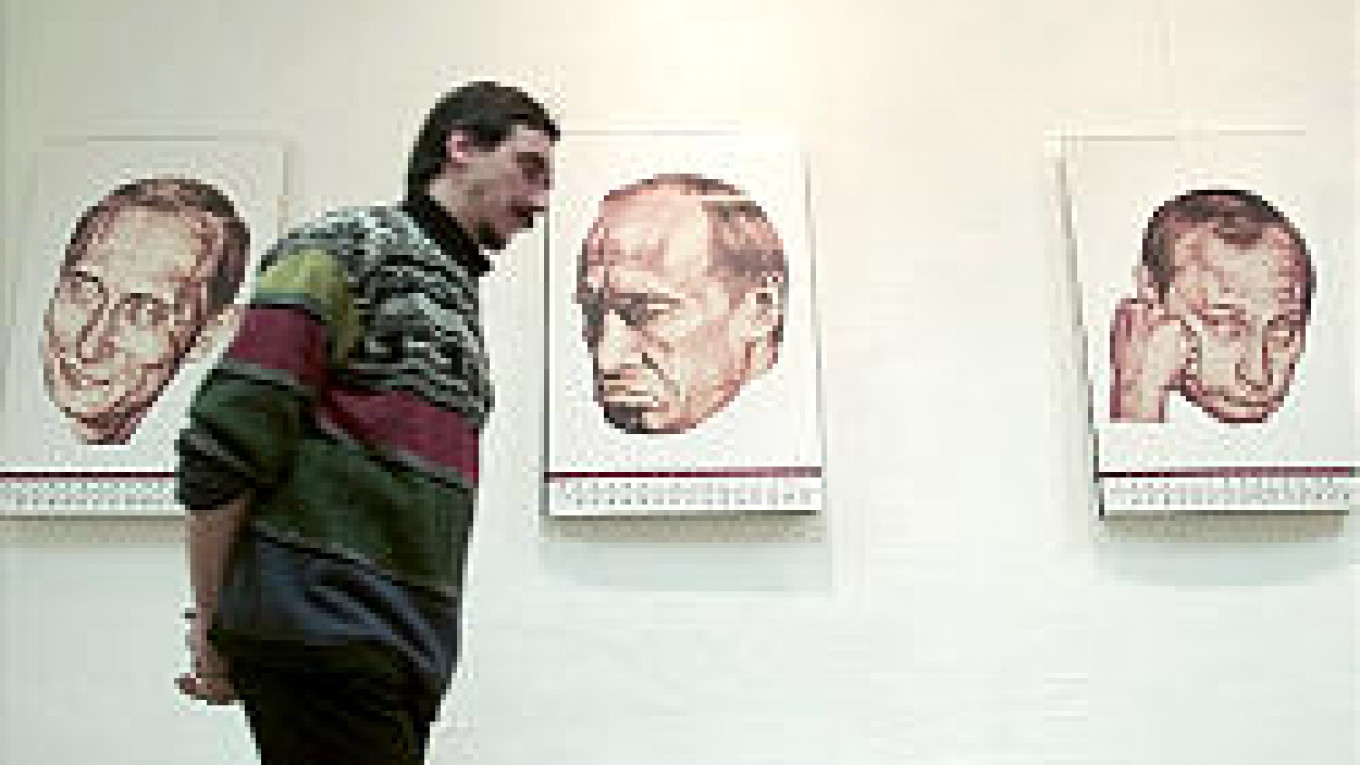Twelve Vladimir Putins?
It may not be a dream gift for every member of the family, but this Christmas, Putin-loving bureaucrats can fill their stockings with a must-have new accessory: a Pop Art calendar comprising 12 portraits of the president by well-known Moscow artist Dmitry Vrubel and his wife, Viktoria Timofeyeva.
One thousand copies of the 90- by 60-centimeter calendars have been produced, although none are for sale. Instead they have been presented to a lucky few in the State Duma, the Federation Council and the Kremlin itself.
Reaction has been positive, with demand exceeding supply and some calendars already disappearing. Editors of various newspapers have requisitioned them for their office walls after Vrubel lent them to journalists for scanning purposes.
Members of the public can see the pictures at an exhibition titled "The 12 Moods of the President," which debuted this week at the A5 Gallery on Starokonyushenny Pereulok, off the Arbat.
The exhibition features 12 portraits of very different Putins for each month and a full-length portrait of Putin in his judo outfit for the calendar cover.
Vrubel drew the portraits from photographs.
The Putins that stare out from the walls of the gallery are sad, happy, worried and querulous -- or perhaps constipated, as one visitor suggested.
An alternative picture that Vrubel painted for his own amusement of Putin in his judo robes is not on show -- it is much the same as the calendar version, except that Putin's nipple is pierced.
"This is the genre of pop art," said Vrubel, sitting to the side of happy Putin. "It's work with superstars, hyperimages."
Vrubel's theory is that the biggest superstars in Russia are the chinovniks, or bureaucrats, and the oligarchs and politicians who rule the country.
"And above them all is the personage of Putin," Vrubel said.
Vrubel told Nezavisimaya Gazeta that Putin was an obvious choice, despite the common complaint that Putin has a poker-faced expression most of the time.
"We, while drawing, literally fell in love with him," Timofeyeva told the newspaper.
Vrubel is most famous for a 1990 painting on a section of the former Berlin Wall, titled "The Mortal Kiss," which reproduced a kiss between Soviet leader Leonid Brezhnev and East German leader Erich Honnecker. The message on the painting said: "God, let me survive among this mortal love."
"Putin probably saw it," Vrubel told Nezavisimaya Gazeta. "He was in [East Germany] at that time. Maybe he went to Berlin to have a look."
Vrubel is not the first and is unlikely to be the last Russian artist to paint President Putin. Last year, an exhibition at the Soyuz Tvorchestvo gallery showed various artists' images of Putin with jet planes and ships and even a picture of him as a child called Vova.
Nikas Safronov -- another artist with a knack for self-publicity, who has painted stars ranging from Jack Nicholson to Alla Pugachova -- has his own portrait of Putin hanging in the Kremlin. It is now on sale in Moscow bookshops.
Although Putin has publicly asked not to be immortalized in works of art, he has become the object of eulogistic pop culture since becoming president: His image has been woven into carpet, his head wrought in clay and he has even been put in children's books.
A Message from The Moscow Times:
Dear readers,
We are facing unprecedented challenges. Russia's Prosecutor General's Office has designated The Moscow Times as an "undesirable" organization, criminalizing our work and putting our staff at risk of prosecution. This follows our earlier unjust labeling as a "foreign agent."
These actions are direct attempts to silence independent journalism in Russia. The authorities claim our work "discredits the decisions of the Russian leadership." We see things differently: we strive to provide accurate, unbiased reporting on Russia.
We, the journalists of The Moscow Times, refuse to be silenced. But to continue our work, we need your help.
Your support, no matter how small, makes a world of difference. If you can, please support us monthly starting from just $2. It's quick to set up, and every contribution makes a significant impact.
By supporting The Moscow Times, you're defending open, independent journalism in the face of repression. Thank you for standing with us.
Remind me later.


